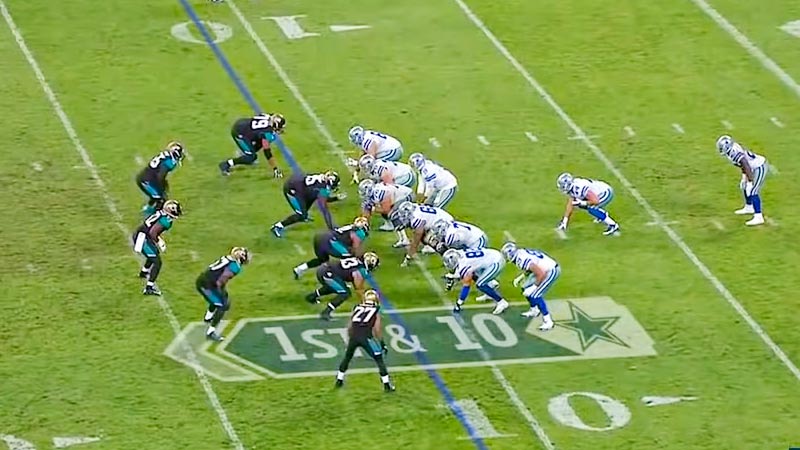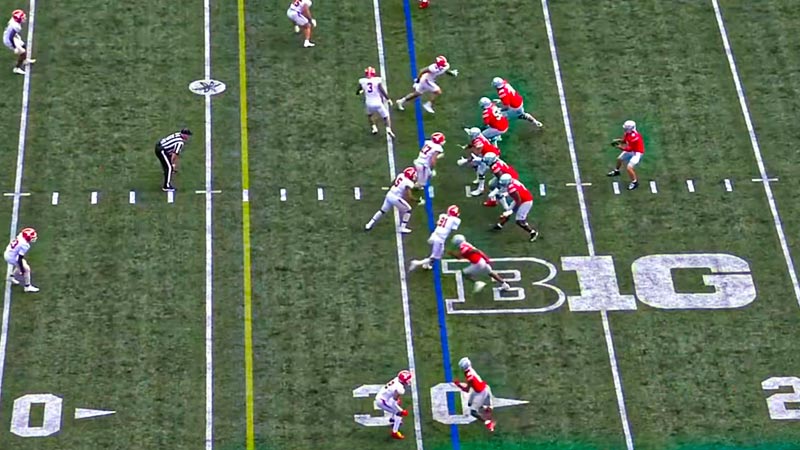Football, often hailed as the beautiful game, is a sport that transcends borders and unites fans worldwide. Behind the exhilarating matches and roaring stadiums lies a complex web of eligibility rules that govern who can play at different levels.
Whether you’re a devoted fan or a newcomer to the sport, understanding these regulations is essential. Indeed, you can’t understand a lot of things without having an idea on this matter.
This guide aims to unravel the intricacies of football eligibility rules, shedding light on frequently asked questions and providing clarity on the criteria that determine who can step onto the pitch.
High School Football Eligibility Rules
High school football eligibility rules can vary depending on the specific regulations set by state athletic associations, school districts, and individual schools.
However, there are some common eligibility rules that tend to apply in many places. Here are some general eligibility rules that might apply to high school football players:
Age
Typically, a student-athlete must be within a certain age range to be eligible to play high school football.
Usually, this means they must be under a certain age (often 19 years old) before a specific date, usually around the beginning of the academic year.
Academic Standing
Most high school athletic associations require student-athletes to maintain a minimum GPA (Grade Point Average) to be eligible to participate in sports.
If a student’s GPA falls below a certain threshold, they might become ineligible until their grades improve.
Attendance
Regular attendance in classes is often a requirement for eligibility. If a student has poor attendance or is frequently absent, they might be at risk of becoming ineligible to play.
Residency
Students typically need to reside within the school district’s boundaries or meet other residency requirements to be eligible for participation.
Transferring students might need to go through additional steps to establish eligibility, especially if they’re transferring for athletic reasons.
Amateur Status
High school athletes are usually required to maintain amateur status, meaning they can’t receive payment, gifts, or other incentives for their athletic performance. Accepting compensation could lead to ineligibility.
Physical Examination
Many schools require student-athletes to undergo a pre-participation physical examination conducted by a qualified medical professional.
This ensures that the athlete is physically fit to participate and doesn’t have any conditions that could put their health at risk.
Behavior and Conduct
Some schools and athletic associations have rules regarding behavior and conduct. Students who have been suspended, expelled, or engaged in serious misconduct might face eligibility consequences.
Enrollment
Students are usually required to be enrolled in the school where they are participating in sports. This prevents students from enrolling in a school solely for athletic purposes.
Number of Seasons
There might be limitations on how many seasons a student-athlete can participate in a particular sport. This is often to prevent students from extending their high school education just to keep participating in sports.
Transfer Rules
If a student transfers from one school to another, they might face specific transfer rules that could affect their eligibility. These rules are often in place to prevent recruiting and ensure fair play.
It’s important to note that these rules can vary widely depending on where you’re located. If you’re looking for specific information about high school football eligibility rules in your area, I recommend checking with your local school district, state athletic association, or the school’s athletic department.
College Football Eligibility Rules

College football eligibility rules are set by the National Collegiate Athletic Association (NCAA), the governing body for college sports in the United States.
These rules outline the requirements student-athletes must meet in order to compete in NCAA-sanctioned sports, including college football. Here are some key eligibility rules for college football players:
Academic Eligibility
Student-athletes must meet minimum academic requirements to be eligible to play. These requirements include a specific high school GPA and standardized test scores (e.g., SAT or ACT). The NCAA sets academic eligibility standards called the Academic Eligibility Requirements.
Amateurism
College football players must maintain their amateur status, meaning they can’t receive payment for their athletic performance beyond certain allowable expenses. Accepting money or benefits for playing football could result in loss of eligibility.
Enrollment and Full-Time Status
Student-athletes must be enrolled as full-time students at their college or university and make progress toward a degree. They typically need to maintain a certain number of credit hours per semester to remain eligible.
Transfer Rules
If a college football player wants to transfer from one NCAA institution to another, they must follow transfer rules. This might involve sitting out a year of competition, depending on various factors, unless they qualify for an exception or receive a waiver.
Redshirt and Medical Redshirt
Players may be granted a “redshirt” year, which allows them to practice with the team and retain four years of eligibility. A “medical redshirt” may be granted if a player is injured early in the season and misses a significant portion of games.
Five-Year Clock
Student-athletes have five years to complete four seasons of eligibility, starting from their initial enrollment in a college or university. This is known as the “five-year clock.”
Graduate Transfer Rule
Players who have completed their undergraduate degree and have remaining eligibility can transfer to another institution and play immediately, provided they are accepted into a graduate program not offered at their current school.
Behavior and Conduct
College athletes are expected to adhere to a code of conduct and behave responsibly. Violations of team or NCAA rules could result in disciplinary actions, including loss of eligibility.
Injury Hardship Waiver
If a player is injured and misses a significant portion of a season, they might be eligible for an injury hardship waiver that could grant them an extra year of eligibility.
Initial Eligibility Clearinghouse
Prospective college football players must register with the NCAA Eligibility Center during high school to ensure they meet initial eligibility requirements. This involves submitting academic records, test scores, and other relevant information for evaluation.
It’s important to note that these rules can be complex, and eligibility determinations can vary based on individual circumstances.
Student-athletes and their families should work closely with their school’s compliance office and athletic department to ensure they understand and meet all eligibility requirements.
Football Eligibility Rules in the NFL

The National Football League (NFL) has specific eligibility rules that govern who can play in the league. These rules are designed to ensure fairness, safety, and the overall integrity of the game.
Here are some key eligibility rules for playing in the NFL:
Draft Eligibility
Players are eligible for the NFL Draft after three years of college football eligibility have passed since their high school graduation. Players who enter the draft early must declare their intention to do so, foregoing their remaining college eligibility.
Underclassmen Declaration
Underclassmen (players who have not completed three years of college eligibility) can declare for the NFL Draft, but they must formally declare their intentions and meet specific eligibility criteria.
Undrafted Players
Players who are not selected in the NFL Draft can sign with any NFL team as an undrafted free agent. These players often have the opportunity to compete for roster spots through training camp and preseason games.
International Players
Players from countries other than the United States are eligible to play in the NFL. The NFL has initiatives such as the International Player Pathway Program to help develop international talent.
Player Combine and Pro Days
Players eligible for the draft are invited to the NFL Scouting Combine, where they showcase their skills and abilities in front of team representatives. Additionally, colleges and universities often hold Pro Days for their draft-eligible players to demonstrate their capabilities.
Age Requirement
There is no specific age requirement for players to be eligible for the NFL Draft, but most players are eligible after three years of college football.
Physical Condition and Health
Players must meet certain medical and physical requirements to participate in the NFL. Medical evaluations, including thorough examinations of a player’s health and injuries, are common before and during the draft process.
Drug Testing and Conduct
Players are subject to the NFL’s drug testing program, and violations can result in suspensions. The NFL also places emphasis on conduct both on and off the field, with disciplinary actions for behavior that goes against the league’s standards.
Rookie Contracts
Players drafted in the NFL are signed to rookie contracts that specify their compensation and terms. The NFL has a rookie salary scale that determines the maximum amount a rookie can earn based on their draft position.
Physical Abilities and Skill Level
To be successful in the NFL, players must have the necessary physical attributes and skill levels for their positions. NFL teams evaluate players based on their performance in college, scouting reports, and other factors.
It’s important to note that these rules and regulations might evolve over time. If you’re interested in pursuing a career in the NFL, it’s recommended to refer to the official NFL website or consult with player agents or representatives who are knowledgeable about the current eligibility requirements and processes.
Penalties for Football Eligibility Rules
Penalties for violating football eligibility rules can vary depending on the level of play (high school, college, or professional) and the specific nature of the violation.
These penalties are put in place to maintain fairness, uphold the integrity of the game, and ensure that all participants adhere to the established rules.
Here are some examples of penalties that could be imposed for violating football eligibility rules:
High School Football Eligibility Rule Violations
- Ineligibility to Play: Students who do not meet academic, age, or other eligibility requirements might be declared ineligible to participate in high school football until they rectify the issue.
- Forfeiture of Games: If a team is found to have fielded an ineligible player, the team could face penalties such as forfeiting games in which the ineligible player participated.
- Team Penalties: The team itself could face penalties, including fines, suspensions, or probation, depending on the severity and frequency of eligibility violations.
- Loss of Awards: Players who are later found to have been ineligible during a season might have awards and honors stripped.
College Football Eligibility Rule Violations
- Loss of Eligibility: If a college football player is found to have violated eligibility rules (e.g., receiving impermissible benefits), they might be declared ineligible to play for a certain period of time or indefinitely.
- Vacating Wins: If a team uses ineligible players, any wins in which those players participated could be vacated, and the team’s records could be adjusted accordingly.
- Scholarship Reductions: If a college or university is found to have violated eligibility rules, they might face penalties such as a reduction in scholarships, which limits the number of players they can recruit.
- Postseason Bans: In serious cases, teams could be banned from participating in postseason games, including bowl games or conference championships.
- Fines: Schools or individuals involved in eligibility violations might be subject to fines as a deterrent against rule-breaking.
- Probation: A college or university might be placed on probation, during which they are monitored more closely for a certain period of time.
NFL Eligibility Rule Violations
- Suspensions: In the NFL, players who violate eligibility rules, drug policies, or conduct policies might face suspensions, which could impact their ability to play in games.
- Fines: Players or teams that violate NFL rules might be fined as a form of penalty.
- Loss of Draft Picks: In certain cases, NFL teams might lose draft picks as a consequence of violating league rules.
- Contract Voiding: Players who violate the terms of their contracts, including eligibility rules, might have their contracts voided, which could impact their compensation and playing status.
The severity of penalties can vary based on the specific circumstances of the violation and the governing body’s rules and regulations.
Whether it’s high school, college, or professional football, participants and organizations are expected to adhere to the established eligibility rules to ensure the fairness and integrity of the sport.
Importance of Football Eligibility Rules

Football eligibility rules are of paramount importance for several reasons:
Fair Competition
Eligibility rules ensure that all players and teams are on a level playing field. Without these rules, some teams or players might gain an unfair advantage by recruiting or fielding ineligible players.
Maintaining Integrity
Eligibility rules help maintain the integrity of the game. They prevent cheating, manipulation of player recruitment, and other actions that could undermine the honesty and credibility of football competitions.
Protecting Student-Athletes
In high school and college football, eligibility rules prioritize the academic well-being of student-athletes. By requiring a minimum GPA and academic progress, these rules encourage athletes to focus on their education alongside their athletic pursuits.
Encouraging Academic Excellence
Eligibility rules motivate student-athletes to perform well academically in order to participate in the sport. This can lead to improved educational outcomes for athletes.
Encouraging Player Development
Eligibility rules can prevent the premature entry of athletes into professional leagues. This allows players to develop their skills and maturity before making the leap to the next level.
Player Safety
Eligibility rules help ensure that players are physically and medically fit to participate. These rules might require medical examinations, ensuring that players are not placed in situations where their health is at risk.
Compliance and Consequences
Eligibility rules establish clear guidelines for what is permissible and what is not. This helps individuals, schools, and organizations understand their responsibilities. The consequences for rule violations serve as deterrents against misconduct.
Preventing Exploitation
In college and high school football, eligibility rules prevent players from being exploited by recruiters, agents, or others seeking to benefit from their talent without regard for their well-being.
Team and Sport Reputation
Violations of eligibility rules can tarnish the reputation of teams and institutions. Adherence to these rules helps maintain a positive image for both the individual teams and the sport as a whole.
Long-Term Success
By ensuring that players are eligible and prepared, eligibility rules contribute to the long-term success and sustainability of football programs, leagues, and organizations.
Consistency
Eligibility rules create a consistent framework that applies to all players and teams. This promotes uniformity in how the game is played and how participants are treated.
Teaching Values
Upholding eligibility rules teaches athletes important values such as responsibility, discipline, and the importance of abiding by rules and regulations.
Football eligibility rules serve to protect the essence of the game, the well-being of the athletes, and the spirit of fair competition.
They contribute to the development of athletes both on and off the field, ensuring that football remains a positive and enriching experience for everyone involved.
FAQs
What are football eligibility rules?
Football eligibility rules are a set of criteria established by governing bodies to determine a player’s eligibility to participate in various competitions.
These rules consider factors like age, nationality, previous affiliations, and amateur or professional status.
How does age eligibility work in football?
Age eligibility is crucial in youth and senior football alike. Different age groups have specific competitions, such as under-18 or under-21 tournaments. Players must fall within the stipulated age range to participate.
However, age calculations can vary depending on regional regulations and tournament guidelines.
Can a player represent a national team they weren’t born in?
Yes, players can represent a national team that they weren’t born in, provided they meet specific criteria.
FIFA, football’s global governing body, allows players to switch national teams if they haven’t played in an official senior competitive match for their previous country and meet other eligibility requirements, such as having citizenship of the new country.
What role does previous club affiliation play in eligibility?
Players’ previous club affiliations can impact their eligibility to participate in certain tournaments.
For instance, if a player has already represented one club in a competition, there might be restrictions on representing another club in the same tournament during the same season. This rule aims to maintain fairness and prevent conflicts of interest.
Can amateur and professional players compete together?
In some cases, amateur and professional players can compete together in the same team, especially in lower-tier or local leagues.
However, in higher-level and professional competitions, the distinction between amateur and professional players becomes more pronounced due to financial and contractual considerations.
Wrapping Up
As the world tunes in to witness football’s magic on the field, understanding the eligibility rules that underpin the game becomes ever more important. These rules, often intricate and occasionally debated, are the threads that weave together the fabric of fair play, sportsmanship, and integrity.
Whether you’re an aspiring player, an ardent supporter, or just someone who enjoys the thrill of the sport, grasping the fundamentals of football eligibility rules adds a layer of appreciation to the game we all love.
So, the next time you cheer for your favorite team or player, remember the journey they’ve undertaken to step onto that hallowed turf – a journey governed by the rules that ensure football remains captivating and full of surprises.
Have a nice day.







